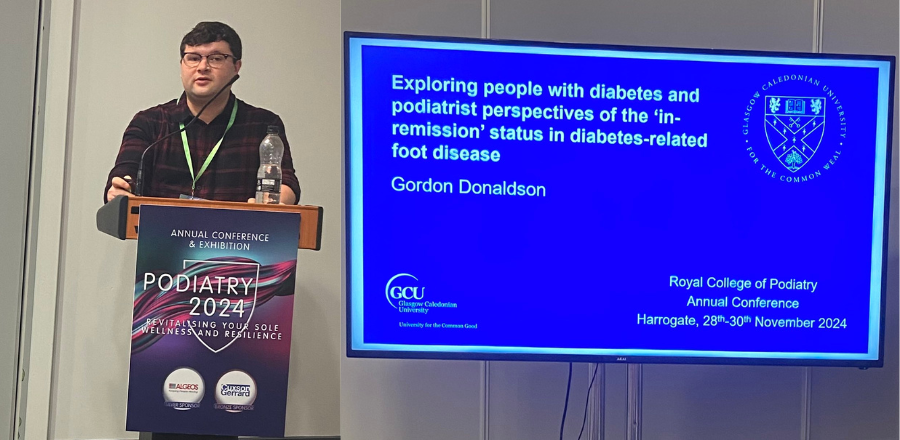Student’s interest in diabetes opens up future career opportunities

A final year Podiatry student’s recent appearance at a national conference is helping shape a potential future career in research.
Gordon Donaldson got the chance to complete a qualitative project earlier this year through the Carnegie Trust Vacation Scholarships. Gordon’s work focused on the perceptions both patients and Podiatrists have of the term ‘in-remission’ when it comes to diabetes foot disease.
Following the success of his research, he then applied to present his findings at the Royal College of Podiatry’s Annual Conference in Harrogate last month.
“I think diabetes was the first thing that took me by surprise studying Podiatry simply in terms of how serious it can be,” explained Gordon.
“If you’ve got diabetes and consistently high blood sugar then it can damage the small and large blood vessels that supply your nerves, so you can lose sensation in your feet and you can lose control of the muscles - this can cause structural changes and a loss of sensation in your feet.
“People with diabetes get classified by the NHS based on their risk of foot disease. I wanted to focus on one of the specific risk classifications, ‘in-remission’.
“Doctors and Podiatrists don’t like to tell people they’re healed as this can make individuals think everything is over and done with - the evidence actually suggests they’re at high risk of developing foot disease again.”
After hearing about the Carnegie Trust Vacation Scholarship, which aims to encourage Undergraduate students to develop their independent research skills, Gordon knew the next steps he wanted to take.
“I basically just had to put in an application form that asked about my interest in the topic and how it might positively impact my future career. I was absolutely delighted when it was accepted.
“The Scholarship was a ten-week project over the summer. The first part was getting ethical approval for the research and then we decided to do qualitative research looking at what people with diabetes and podiatrists thought about the term ‘in-remission’.
“The reason ‘in-remission’ is used for patients is because the mortality risk from diabetes foot disease and cancer is quite similar, so podiatrists have been pulling the language used in cancer care to help convey how severe foot disease is. We wanted to get an idea around what it means for them and what impact it has so we could basically see that the phrase was having the appropriate impact.”
Gordon spoke to a total of nine patients and 12 Podiatrists, and was keen to take his results further once he had concluded his findings.
He explained: “My project basically found that the wording isn’t having the intended impact. ‘In-remission’ is obviously a medical term and helps Podiatrists know that patients have had foot disease and are at high risk.
“It’s a phrase that’s really useful for Podiatrists to use clinically but they then think that’s a phrase that should just be used between them and other Podiatrists - they don’t really use it in conversation with their patients. Instead they would often tell patients that they are ‘healed’, which is a very different meaning to ‘in-remission’.
“When we explained the differences to patients, they tended to take it a lot more negatively because ‘in-remission’ obviously means there’s a chance it could come back.”
Gordon added: “I then submitted my work to the Royal College of Podiatry’s Annual Conference and got the chance to complete an oral presentation of my findings.
“We were in a side auditorium and there were six speakers in an hour-long slot. It was a bit intimidating because some of the speakers were Professors – there were a few moments where I thought ‘what am I doing here?’.
“Thankfully it was such a nice audience with nice people – everyone was really supportive. There were a bit of nerves beforehand but everything went really well.”
It’s been quite the journey for Gordon, who previously worked as a translator before studying at GCU, but he’s already thinking of his next steps beyond graduation.
“I’ve had some talks with my lecturers, Dr Ruth Barn and Dr Gordon Hendry, about applying for a PhD, which would help take my research forward. I’d be able to do that in conjunction with clinical work as well, practicing as a Podiatrist alongside the PhD. It’s definitely something I’m very interested in.
“I’d never have expected to be getting to the point where I’m potentially looking at completing a PhD, but it’s pretty cool that it’s now looking like a possibility.”
Find out more about GCU’s BSc (Hons) Podiatry course here
By Ross Clark
Got an SHLS or GSBS story? Email me at Ross.Clark@gcu.ac.uk or message me on Twitter
